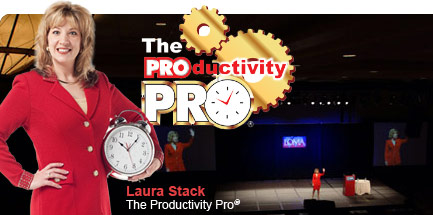Top Ten Time Management Traps for 2012
These days, despite technology intended to make life easier, we tend to work harder and have less discretionary time than ever before. Why?
After 20 years speaking at conferences and implementing productivity-improvement programs at Fortune 1000 companies, I've come to recognize certain nemeses most of us face repeatedly. While clients do occasionally surprise me with the nature of their time management headaches, about 95% of the time, the traps they find themselves mired in fall into the same familiar handful of categories. So to kick off a productive 2012, let's take a look at the ten biggest time traps faced by the modern worker. I'll discuss the common variations of each, and offer some advice on how to overcome them.
Trap #1: Prioritization
Setting workplace priorities is by far the most common time management complaint I hear, and it comes in two flavors: either the worker has problems juggling multiple projects and can't set his or her own priorities, or the boss has problems setting priorities for the employee. Often, the boss labels everything as equally urgent, leaving workers to throw up their hands in frustration and simply guess which project to focus on-which may cause drama and stress later on, if they guess wrong or the boss proves unreasonable.
Whether the failure to set priorities is the boss's or the worker's, the worker ends up scrambling, and may soon fall prey to overwork and overwhelm (which represents another common time trap; see below). The solution, while easy to state, may be difficult to accomplish: firmly ask your boss to prioritize your projects. Then ruthlessly triage your task list, focusing first on the items that truly matter. Prioritize everything else according to relative value.
Trap #2: Interruptions and Distractions
This timewaster consists of anything unscheduled but routine that disrupts an individual's focus and thereby damages productivity at work. Meetings and crises don't count; they have their own categories.
I imagine you could fill up a whole page (or more) with a list of the various interruptions and distractions that impact your workplace productivity: coworkers who drop in at random intervals; ringing phones; noisy neighbors; and micromanaging bosses. Communications issues, especially those involving email and phone calls, plague us all constantly, and represent almost a third of this category of complaints.
Overcoming this particular trap requires a firm application of self-discipline. If something distracts or interrupts you, make the effort necessary to guard against it. If you have an executive assistant, have them guard access to you. Otherwise, tighten your focus. Use ambient sound or music to block out noise. Turn off your email alerts and close your browser. Forward your calls to voicemail when you have no time for calls and respond a few times a day. Go somewhere quieter for a while or work from home one day a week.
Read the rest of the article here.
If you'd like further details on how to construct and maintain an effective workflow process that allows you to get everything done and still have a life outside of work, be sure to grab a copy of my new book, What To Do When There's Too Much To Do, when it hits bookstores in 2012.
Make it a productive day! (TM)
(C) Copyright 2012 Laura Stack. All rights reserved. www.TheProductivityPro.com |
Reviving Work Ethic
I rarely recommend books to you, but in this case, I can wholeheartedly and enthusiastically recommend Eric Chester's important new work: Reviving Work Ethic. Here's what he had to say about motivating disengaged workers to give their productive best:
If you were speaking to a disengaged or disenfranchised worker, what advice would you give them to motivate them to give their best?
1. Do whatever is within your control to eliminate the things that demotivate you. For example, when you're choosing who to go to lunch with or hang out after work with, surround yourself with coworkers who enjoy their job as opposed to those "Debbie Downers" who are always complaining about the boss, the company, etc. If the break room makes you feel like you are in a jail cell, volunteer to come in on your day off and repaint it or bring in some table games, or posters, or music, etc. In other words, take steps to create a more positive space for you to operate.
2. Get out of the mindset that 'work sucks' or that 'you're stuck'. This is a free country and no one is making you work where you do. No matter who you are, what skills you currently have, or what you do to earn your daily bread, you have options. You can work harder and perform better in an attempt to get a promotion. You can use your off work time to take classes or improve your skills to move up in your present company or to become more hirable to another. You are in control of your career, so don't allow yourself to develop a defeatist attitude or you will end up stuck, or worse, fired.
3. Work like you're showing off. Approach your next shift as if your every move is being video recorded for a worldwide audience and that your parents, kids, friends, and future employers are all tuned-in. If you perform your normal job as you would under these conditions for an entire day, it would be impossible to feel down and disengaged. In fact, it will be impossible for your employers not to notice you. Very soon, you will be the very best at your job, and once you are, you will be promoted, you will see a dramatic increase in your pay, and you will be sought out by other employers. When you are the best at your job, your future is unstoppable.
Eric Chester is an award winning keynote speaker and the author of Reviving Work Ethic: A Leader's Guide to Ending Entitlement and Restoring Pride in the Emerging Workforce (Greenleaf 2012). He is also the Founder and CEO of The Bring Your A Game to Work program. He can be reached at 303-239-9999 or through www.RevivingWorkEthic.com
Time Tips and Tricks
To be featured in this section of our newsletter and get a free eBook with our thanks, send your productivity tip or trick to Becca@TheProductivityPro.com with "Tips and Tricks contribution" in the subject line.
Email etiquette guidelines - Essex Foster Carer's Association
Be polite
- Always use please and thank you where appropriate
- Kick off the message with a Hi Joe or Hello Sam and close with greeting - Regards, Fred
- USING ALL CAPITAL LETTERS is generally received as aggression.
- Use the subject field to indicate content and purpose. Don't just say, "Hi"
Be informal, but not sloppy
- We often use commonly accepted acronyms in e-mail, but in our world there are many acronyms and may not immediately come to the readers mind
- Many email hosts are not good on spelling and grammar. Consider cutting and pasting from a word processor.
Read the rest of the article here.
This document is heavily based on an article by Laura Stack, MBA, CSP, The Productivity Pro®
http://office.microsoft.com/en-us/outlook-help/12-tips-for-better-e-mail-etiquette-HA001205410.aspx
Words of Wisdom
"Time is what we want most, but what we use worst." -- William Penn, British philosopher and founder of the Commonwealth of Pennsylvania.
"If you want to make good use of your time, you've got to know what's most important and then give it all you've got." -- Lee Iacocca, American author and industrialist.
"It is not enough to be busy; so are the ants. The question is, what are we busy about?" -- Henry David Thoreau, American philosopher.
"The bad news is, time flies. The good news is, you're the pilot." -- Michael Altshuler, American sales consultant.
"Until we can manage time, we can manage nothing else." -- Peter Drucker, American author and management consultant. |



